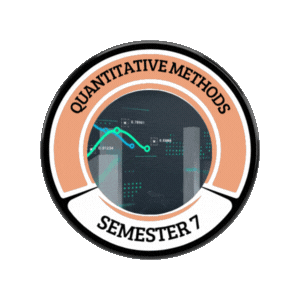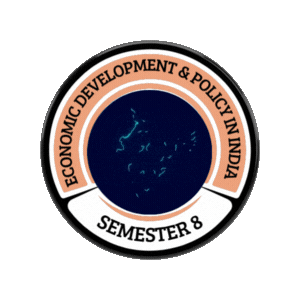
Semester I
Semester 1 of the economics program is crucial for building a strong foundation in the field, essential for both a career in economics and future entrance exams like RBI, IES and Masters. It comprises three core subjects, each significant for developing a solid understanding of economics. Among these, Introductory Mathematics & Statistics are challenging, underlining its importance in the curriculum.
Semester II
In Semester 2, students will delve into intermediate versions of mathematics and statistics, two crucial subjects that build upon the foundations laid in the previous semester. These courses are not only vital for a thorough understanding of economics but are also integral components of economics entrance exams nationwide. Alongside these, the third core subject, Introductory Macroeconomics, is introduced.
Semester III
Semester 3 is considered the most challenging phase of the economics program, featuring all core papers at an advanced level. To succeed, students should focus on solving a sufficient number of numerical problems during their preparation. This semester's rigor is particularly beneficial for those planning to pursue a master's degree in Economics, as it provides a deep and comprehensive understanding of advanced concepts.
Semester IV
Semester 4 continues to be challenging, with Econometrics as a key course that is crucial for careers in analytics and academia. Excelling in Econometrics can significantly boost your career prospects, akin to giving it "Red Bull wings." The other two advanced courses in microeconomics and macroeconomics are also challenging but important, laying a strong foundation for future academic and professional endeavors in the field of economics.
Semester V
Reaching the halfway mark, the journey through the economics program starts to ease, allowing students to focus more on career goals. The courses in the subsequent semesters, with a few exceptions, are specialized subjects that build upon the foundational knowledge acquired in the first four semesters. Semester 5 introduces an intriguing subject, Game Theory, which adds an element of excitement to what might otherwise be a routine semester. This shift marks a transition into more specialized areas of study, leveraging the strong base established earlier in the program.
Semester VI
In Semester 6, the subjects are particularly relevant for competitive exams like UPSC Civil Services (CSE), UPSC Indian Economic Services (IES), and RBI Grade B Examination. International Trade, a key subject in this semester, is analytical and demands a strong grasp of economic theories. The other subjects are contemporary, requiring students to stay informed about current economic developments. This blend of analytical and current-affairs-oriented study makes Semester 6 vital for those aiming for a career in government services or policy-making.
Semester VII
In the final year of the economics graduation program, students will engage with a mix of core and elective subjects, comprising one core subject and a combination of three Discipline Specific Electives and General Electives. This period also marks a significant shift towards research, with a strong emphasis on dissertation work, offering students the opportunity to begin their journey in academic research. This phase is crucial for developing specialized knowledge and honing research skills, setting the stage for advanced studies or professional pursuits in economics.
Semester VIII
In the final year of the economics graduation program, students will engage with a mix of core and elective subjects, comprising one core subject and a combination of three Discipline Specific Electives and General Electives. This period also marks a significant shift towards research, with a strong emphasis on dissertation work, offering students the opportunity to begin their journey in academic research. This phase is crucial for developing specialized knowledge and honing research skills, setting the stage for advanced studies or professional pursuits in economics.




















